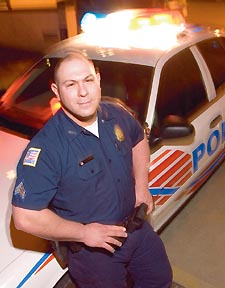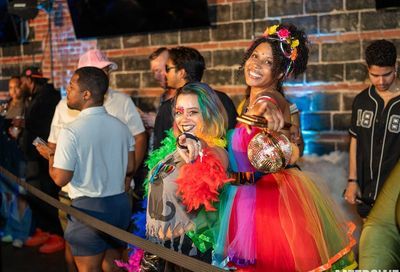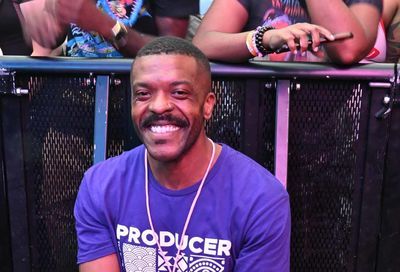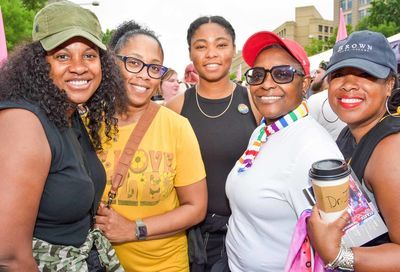Brett's Back
Police chief appoints former Gay and Lesbian Liason Unit head as supervisor of all liaison units, issues transgender order
The Metropolitan Police Department is increasing the clarity in its arsenal. Chief Cathy Lanier’s plan to expand the Gay and Lesbian Liaison Unit’s services beyond its Dupont Circle neighborhood started out hazy, but the pieces of the puzzle seem to be falling into place.
Lanier last week appointed Sgt. Brett Parson as the supervisor of the MPD’s four different special liaison units.
“I guess you could say I’m back in a way,” says Parson, former commander of the GLLU. He adds that he is not returning to his former post as commander of the GLLU. Instead, he will be managing the unit’s supervisor, Sgt. Tania Bell.
 |
“I’m in charge of the overall unit called the Special Liaison Unit,” says Parson. “I oversee all of the liaison units within the Police Department.”
In addition to the GLLU, the Special Liaison Unit includes the Latino Liaison Unit (LLU), Asian Liaison Unit (ALU) and the Deaf and Hard of Hearing Unit (DHHU), brought together under what Parson describes as “one consistent supervisor, with a consistent mission.”
Says Parson: “What we will be doing is creating a station where more officers will be operating and utilizing the model and the mission of these liaison units, but they will remain in their full-time assignments as [Patrol Service Area] officers. Our responsibilities at the liaison units will be to train these officers, monitor their work and to maintain consistency among the districts. This will very much be a team effort.”
Under the new model, the supervisors of each unit will work with Parson to further develop a plan to carry out Lanier’s vision of expanding each unit’s services to all seven police districts in Washington, while maintaining their “integrity and independence.”
But even with the announcement of Parson as head of the newly formed Special Liaison Unit, Lanier’s plan is still somewhat vague for many, including Adam Tenner, executive director of Metro TeenAIDS, who serves on Mayor Adrian M. Fenty’s Lesbian, Gay, Bisexual and Transgender Advisory Committee.
“Given the concerns and anxiety expressed by the community, that the GLLU would be disbanded or at least weakened, we’re looking forward to hearing more details of the chief’s plan to make sure that LGBT citizens, as well as every citizen, can be best served by the Police Department,” says Tenner.
“Chief Lanier approached us with a plan which the community was not happy with. After the community meetings, what we’re hearing is that there is a re-organization. We still need to hear more about what’s happening with the plan.”
More concrete is Lanier’s general order, “Handling Interactions with Transgender Individuals,” issued Oct. 12.
The nine-page document offers definitions, procedural guidelines and six regulations that include an anti-search policy if the sole reason is to determine a person’s gender. Lanier released the order in an effort to implement a “professional, respectful and courteous” interaction between all officials who work for the MPD and transgender people.
Transgender activist Toni Collins, who also serves on the Mayor’s LGBT Advisory Committee, was one of many activists who spoke to Lanier about some of the issues regarding transgender people in D.C. and the police.
During a June 2007 meeting with the Mayor’s LGBT Advisory Committee, Collins told Lanier that it was Parson’s efforts with the GLLU, since its June 2001 inception, that changed her perspective about police officers in Washington. Collins, a resident in the city’s 6th District, told Lanier she would contact the GLLU rather than her local police district for help.
“The big issue is that by being a member of the GLBT community, it is just a lot easier to go to someone who is sensitive to myself as well as the issues,” she says.
“I feel a lot at ease that [Parson] is still closely involved, not only with all four units, but that he is taking on a leadership role in the executive office of the chief of police under Chief Lanier. I think this is a good thing for the city.”
Cyndee Clay, executive director of Helping Individual Prostitutes Survive (HIPS), echoed Collins’ sentiments.
“[Parson] is very good at building community. He’s good at having that interaction,” says Clay, adding that she’s noticed a difference in the GLLU’s interaction with HIPS since Parson’s departure.
“I think that it’s no secret that they haven’t necessarily, potentially had the ability, or just haven’t done the community work that they might have done previously,” Clay continues. She attributes that assessment to the idea that there are new people at the GLLU who have not formed the solid relationship that Parson once had with HIPS, one that has the potential to form again.
Addressing the concerns of Tenner and others, Parson says Lanier has no intention of decentralizing or disbanding the liaison units.
“Her vision is to expand the services of these units, but do that in a way that doesn’t take away from street-level policing in the districts,” he says.
Transferring to 3rd District is Lt. Alberto Jova, who was appointed as supervisor of the GLLU when Parson left the unit in January. Jova says he is “unfamiliar” with Lanier’s Special Liaison Unit and therefore cannot comment on why he is not involved in the project.
Although Lanier did not return a Metro Weekly request for comment, Parson says he assumes that his own appointment to the supervisor position “is less a reflection of the job that Lt. Jova was doing and more a reflection of my experience that the chief knows that I’ve had in developing the GLLU’s mission.”
Bell declined to comment on Jova’s departure.
“I can work with anyone just as long as we still continue out the mission of what our unit is about,” she says, “to provide 24-hour service to the GLBT community and beyond.”
Support Metro Weekly’s Journalism
These are challenging times for news organizations. And yet it’s crucial we stay active and provide vital resources and information to both our local readers and the world. So won’t you please take a moment and consider supporting Metro Weekly with a membership? For as little as $5 a month, you can help ensure Metro Weekly magazine and MetroWeekly.com remain free, viable resources as we provide the best, most diverse, culturally-resonant LGBTQ coverage in both the D.C. region and around the world. Memberships come with exclusive perks and discounts, your own personal digital delivery of each week’s magazine (and an archive), access to our Member's Lounge when it launches this fall, and exclusive members-only items like Metro Weekly Membership Mugs and Tote Bags! Check out all our membership levels here and please join us today!























